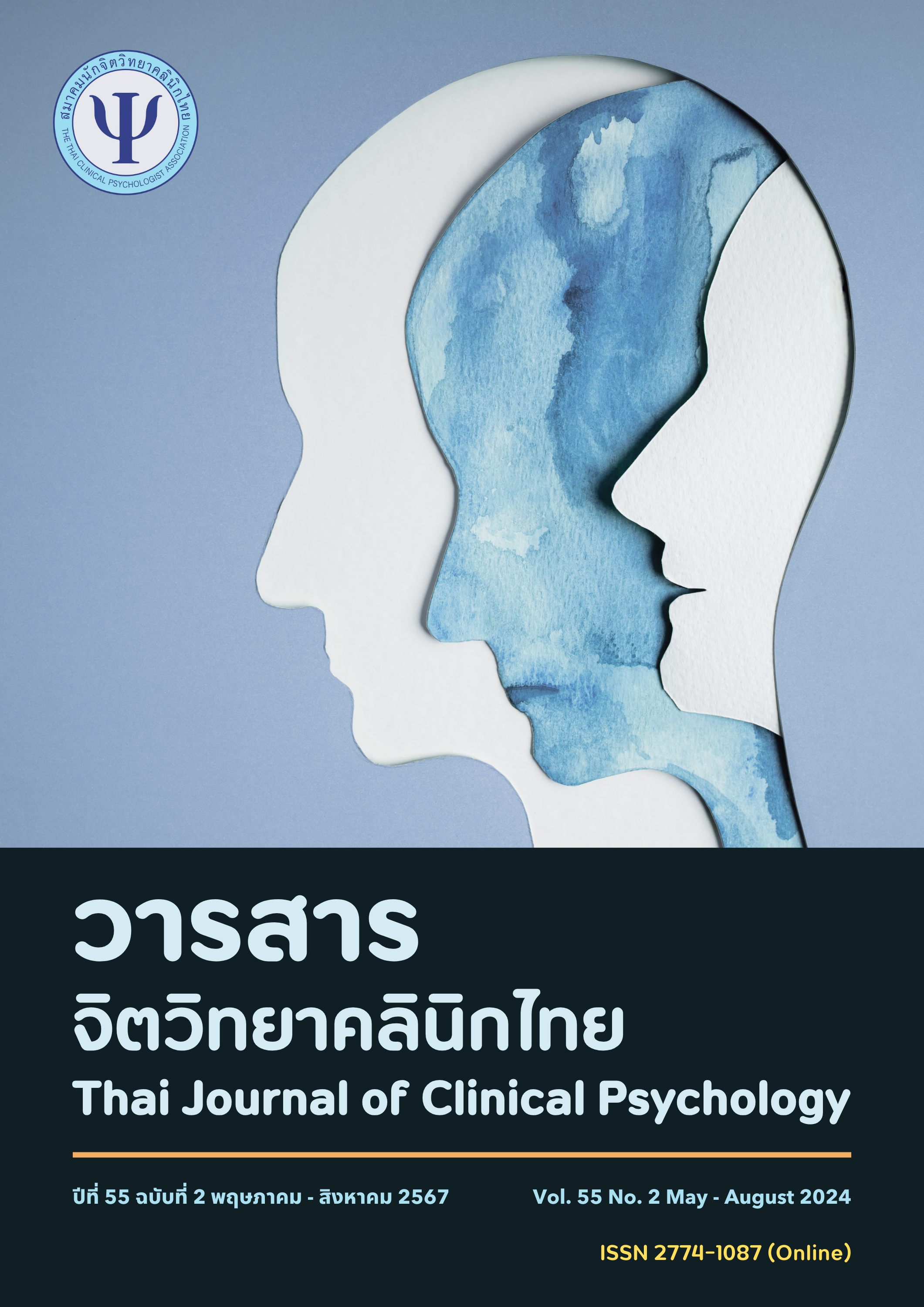ความเชื่อตัวกลางที่เกี่ยวข้องกับความเป็นหญิงด้านการดื่มสุราและ drunkorexia ในนักศึกษาปริญญาตรีหญิง
Main Article Content
บทคัดย่อ
Drunkorexia เป็นแบบแผนพฤติกรรมที่บุคคลควบคุมปริมาณอาหารหรือออกกำลังกายอย่างหนักเกินไปเพื่อคุมแคลอรี่และทำให้สามารถดื่มแอลกอฮอล์ได้มากขึ้น ผลที่ตามมาคือให้บุคคลที่มี drunkorexia ประสบกับความเสี่ยงที่เกิดทั้งพฤติกรรมการกินที่ผิดปกติกับปัญหาจากการดื่มสุราร่วมกัน วัตถุประสงค์ เพื่อศึกษาอิทธิพลของความเชื่อตัวกลางที่เกี่ยวข้องกับความเป็นหญิงด้านการดื่มสุราที่ส่งผลต่อ drunkorexia ของนักศึกษาหญิงระดับปริญญาตรี วัสดุและวิธีการ กลุ่มตัวอย่างในการศึกษาครั้งนี้เป็นนักศึกษาปริญญาตรีที่เคยดื่มสุราในรอบ 1 ปีที่ผ่านมาจำนวน 290 คน การสุ่มตัวอย่างใช้การสุ่มตัวอย่างตามสะดวกผ่านการเก็บข้อมูลออนไลน์ เครื่องมือที่ใช้ประกอบด้วย Drunkorexia Motives and Behaviors Scale และแบบประเมิน Femininity-Related Intermediate Beliefs about Alcohol use Questionnaire การวิเคราะห์ข้อมูลใช้การวิเคราะห์สมการโครงสร้าง ผล ความเชื่อตัวกลางที่เกี่ยวข้องกับความเป็นหญิงด้านการดื่มสุราสามารถทำนาย drunkorexia ได้ร้อยละ 34.5 ความเชื่อตัวกลางเกี่ยวกับการดื่มที่สอดคล้องกับความเป็นหญิงมีอิทธิพลทางบวกต่อ drunkorexia อย่างมีนัยสำคัญทางสถิติ (β = .658) ในขณะที่ความเชื่อตัวกลางเกี่ยวกับการดื่มที่ต่อต้านความเป็นหญิงไม่มีอิทธิพลต่อ drunkorexia อย่างมีนัยสำคัญทางสถิติ สรุป ความเชื่อตัวกลางที่เกี่ยวกับความเป็นหญิงด้านการดื่มสุรามีความ สัมพันธ์กับ drunkorexia การดำเนินการป้องกันปัญหาการดื่มสุราในนักศึกษาหญิงอาจจะต้องคำนึงพฤติกรรมการกินที่ผิดปกติด้วย
Article Details

อนุญาตภายใต้เงื่อนไข Creative Commons Attribution-NonCommercial-NoDerivatives 4.0 International License.
เรื่องที่ลงตีพิมพ์ในวารสารจิตวิทยาคลินิกแล้วถือเป็นลิขสิทธิ์การเผยแพร่โดยวารสารจิตวิทยาคลินิกแต่เพียงผู้เดียว การตีพิมพ์หรือเผยแพร่ซ้ำในที่อื่นต้องได้รับอนุญาตจากกองบรรณาธิการวารสารฯ
เอกสารอ้างอิง
Arzt, N., & Abulhosn, R. (2022, October 6). What is drunkorexia? Definition, effects, & treatments. Choosing Therapy. https://www.choosingtherapy.com/drunkorexia/
Ausanangkornchai, S. (Ed). (2022). Behavioral patterns and trends in alcohol drinking among the Thai population. Centre for Alcohol Studies. (in Thai).
Barry, A. E., Whiteman, S., Piazza-Gardner, A. K., & Jensen, A. C. (2013). Gender differences in the associations among body mass index, weight loss, exercise, and drinking among college students. Journal of American College Health, 61(7), 407-413. https://doi.org/10.1080/07448481.2013.823973
Beck, A. T., Wright, F. D., Newman, C. F., & Liese, B. S. (1993). Cognitive therapy of substance abuse. The Guilford Press.
Beck, J. S. (2011). Cognitive behavior therapy: Basic and beyond (2nd ed.). The Guilford Press.
Burke, S. C., Cremeens, J., Vail-Smith, K., & Woolsey, C. (2010). Drunkorexia: Calorie restriction prior to alcohol consumption among college freshmen. Journal of Alcohol and Drug Education, 54(2), 17-34.
Ciechowska, K., & Polaniak, R. (2022). Drunkorexia-knowledge review. Psychiatria. Polska 56(5), 1131-1141. https://doi.org/10.12740/PP/OnlineFirst/134748
de Jong, M., Spinhoven, P., Korrelboom, K., Deen, M., van der Meer, I., Danner, U. N., van der Schuur, S., Schoorl, M., & Hoek, H. W. (2020). Effectiveness of enhanced cognitive behavior therapy for eating disorders: A randomized controlled trial. International Journal of Eating Disorders, 53(5), 717-727. https://doi.org/10.1002/eat.23239
Eisenberg, M. H., & Fitz, C. C. (2014). “Drunkorexia”: Exploring the who and why of a disturbing trend in college students’ eating and drinking behaviors. Journal of American College Health, 62(8), 570-577. https://doi.org/10.1080/07448481.2014.947991
Furlong, A. (2013). Youth Studies: An Introduction. Routledge.
Giles, S. M., Champion, H., Sutfin, E. L., McCoy, T. P., & Wagoner, K. (2009). Calorie restriction on drinking days: An examination of drinking consequences among college students. Journal of American College Health, 57(6), 603-610. https://doi.org/10.3200/JACH.57.6.603-610
Hill, E. M., & Nolan, M. T. (2021). Examining eating disorder-related social comparison orientation and body dissatisfaction in the relationship between fit ideal internalization and drunkorexia engagement. Eating Behaviors, 41, 101480. https://doi.org/10.1016/j.eatbeh.2021.101480
Hill, E. M., & Ruark, R. (2022). An examination of the role of social comparison orientation and social norms in drunkorexia engagement. Addictive Behaviors, 124, 107107. https://doi.org/10.1016/j.addbeh.2021.107107
Kaya, A., Iwamoto, D. K., Grivel, M., Clinton, L., & Brady, J. (2016). The role of feminine and masculine norms in college women’s alcohol use. Psychology of Men & Masculinity, 17(2), 206-214. https://doi.org/10.1037/men0000017
Knight, A., Castelnuovo, G., Pietrabissa, G., Manzomi, G.M., & Simpson, S. (2020). Drunkorexia: An empirical investigation among Australian female university students. Australian Psychologist, 56(6), 414-423. https://doi.org/10.1111/ap.12212
Laohapongpan, T. N. (2015). Intermediate beliefs toward oneself, mixed alcohol drinks and anti-alcohol advertisement among female youths [Unpublished master’s thesis]. Mahidol University. (in Thai).
Lee, M., & Lee, H. H. (2020). Objective versus subjective comparisons of body size against thin media models, media pressures, internalization, and body satisfaction. The Social Science Journal, 57(3), 269-280. https://doi.org/10.1016/j.soscij.2019.01.004
Mahalik, J. R., Morray, E. B., Coonerty-Femiano, A., Ludlow, L. H., Slattery, S. M., & Smiler, A. (2005). Development of the conformity to feminine norms inventory. Sex Roles, 52, 417-435. https://doi.org/10.1007/s11199-005-3709-7
Möri, M., Mongillo, F., & Fahr, A. (2022). Images of bodies in mass and social media and body dissatisfaction: The role of internalization and self-discrepancy. Frontiers in Psychology, 13, 1009792. https://doi.org/10.3389/fpsyg.2022.1009792
Mulkens, S., & Waller, G. (2021). New developments in cognitive-behavioural therapy for eating disorders (CBT-ED). Current Opinion in Psychiatry, 34(6), 576-583.
Pangtis, O., Sakulsriprasert, C., & Thawornwutichat, R. (2023). Alcohol drinking and feminine identity among female college students: An interpretative phenomenological analysis. Thai Journal of Clinical Psychology, 54(2), 32-45. (in Thai).
Peralta, R. L. (2002). Alcohol use and the fear of weight gain in college: Reconciling two social norms. Gender Issues, 20(4), 23-42. https://doi.org/10.1007/s12147-002-0021-5
Potikul, S., Phukao, D., Sakulsriprasert, C., Payakkakom, A., & Guadamuz, T. (2022). Development and validation of a conceptual model of femininity-related intermediate beliefs about alcohol use among female undergraduate students. Kasetsart Journal of Social Sciences, 43(1), 115-122.
Roosen, K. M., & Mills, J. S. (2015). Exploring the motives and mental health correlates of intentional food restriction prior to alcohol use in university students. Journal of Health Psychology, 20(6), 875-886. https://doi.org/10.1177/1359105315573436
Sakulsriprasert, S., & Sakulsriprasert, C. (2018). Drinking motives and alcohol-related problem in university students: Modeling and testing model invariance across gender. Journal of Education, 19(2), 153-166. (in Thai).
Schumacker, R. E., & Lomax, R. G. (2010). A beginner’s guide to structural equation modeling. Routledge.
Sinampol, P. (2017). “Time and space” for alcoholic beverages accessibility of female students of a university in Chiang Mai Province. Center for Alcohol Studies. (in Thai).
Social Statistics Division, National Statistical Office. (2021). Health behavior of population survey 2021. National Statistical Office.
Speed, S., Ward, R. M., Haus, L., Branscum, P., Barrios, V., Budd, K. M., Lemons, K., & Humenay, E. (2022). A systematic review of common drunkorexia measures: examining gender differences across scales. American Journal of Health Education, 53(5), 342-359. https://doi.org/10.1080/19325037.2022.2100846
Suksai, P., Sakulsriprasert, C., Supreeyaporn, N., & Potikul, S. (2023). Difficulties in emotion regulation and alcohol-related problems among undergraduate students: The mediating role of drinking motives. Thai Journal of Clinical Psychology, 54(1), 1-11. (in Thai).
Trompeter, N., Bussey, K., Forbes, M. K., & Mitchison, D. (2021). Emotion dysregulation within the CBT-E model of eating disorders: a narrative review. Cognitive Therapy and Research, 45(6), 1021-1036. https://doi.org/10.1007/s10608-021-10225-5
Waller, G. Cordery. H., Corstorphine, E., Hinrichsen, H., Lawson, R., Mountford, V., & Russekk, K. (2007). Cognitive behavioral therapy for eating disorders: A comprehensive treatment guide. Cambridge University Press.
Ward, R. M & Galante, M. (2015). Development and initial validation of the drunkorexia motives and behaviors Scales. Eating Behavior, 18(August 2015), 66-70. https://doi.org/10.1016/j.eatbeh.2015.04.003
World Health Organization. (2023). World health statistics 2023: Monitoring health for the SDGs, sustainable development goals. World Health Organization.


